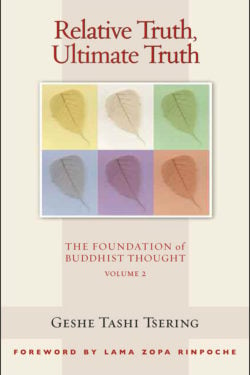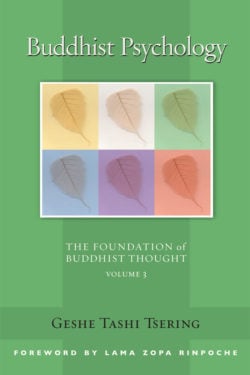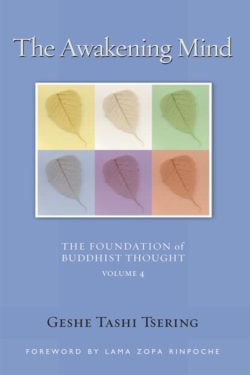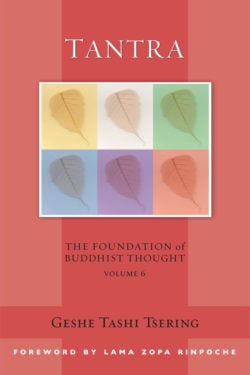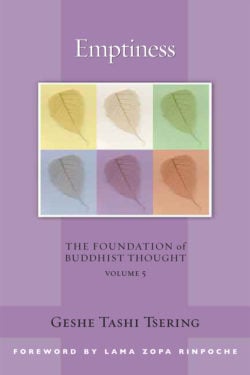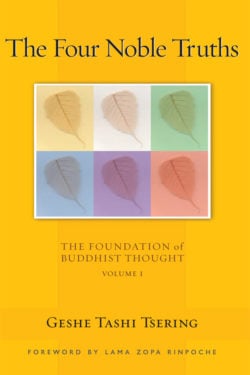Geshe Tashi Tsering

Geshe Tashi Tsering was born in Tibet in 1958 and received his Geshe Lharampa degree (similar to a doctorate in divinity) from Sera Monastery in India in 1987. Since 1994, he has been the guiding teacher of the Jamyang Buddhist Centre in London, while also teaching at other Buddhist centers worldwide.
Books, Courses & Podcasts
Relative Truth, Ultimate Truth
Printed on demand. This book will be printed especially for you and will ship from a separate warehouse.
Relative Truth, Ultimate Truth is a clear and remarkably practical presentation of a core Buddhist teaching on the nature of reality. Geshe Tashi Tsering provides readers with an excellent opportunity to both enhance their knowledge of Buddhism and deepen their perspective on the world.
The Buddhist teaching of the “two truths” is the gateway to understanding the often-misunderstood philosophy of emptiness. This volume is an excellent source of support for anyone interested in cultivating a more holistic and transformative understanding of the world around them and ultimately of their own consciousness.
Buddhist Psychology
This new volume from the Foundation of Buddhist Thought series, provides a stand-alone and systematic—but accessible—entry into how Buddhism understands the mind. Geshe Tashi, an English-speaking Tibetan monk who lives in London, was trained from boyhood in a traditional Tibetan monastery and is adept in communicating this classical training to a modern Western audience.
Buddhist Psychology addresses both the nature of the mind and how we know what we know. Just as scientists observe and catalog the material world, Buddhists for centuries have been observing and cataloging the components of inner experience. The result is a rich and subtle knowledge that can be harnessed to the goal of increasing human well-being.
The Awakening Mind
Bodhichitta, often translated as “great compassion,” is the gem at the heart of Buddhism. From this altruistic desire to serve others, all other Buddhist practices naturally flow, therefore, this state of mind is one Buddhists should understand and cultivate. In The Awakening Mind, Geshe Tashi Tsering leads us through the two main methods to develop bodhichitta that have been developed by the great Indian and Tibetan Buddhists over the centuries: the seven points of cause and effect, and equalizing and exchanging the self with others.
This is the fourth release from Geshe Tashi’s Foundation of Buddhist Thought series, which individually and collectively represent an excellent introduction to Tibetan Buddhism. These unique and friendly books are based on the curriculum of a popular course of the same name, developed by Geshe Tashi himself.
Geshe Tashi’s presentations combine rigor and comprehensiveness with lucidity and accessibility, never divorced from the basic humanity and warmth of his personality. In Geshe Tashi, we encounter the new generation of Tibetan monk-scholars teaching in the West who are following in the footsteps of such revered and groundbreaking teachers as Geshe Wangyal and Geshe Sopa.
Tantra
In this sixth and final volume in the Foundation of Buddhist Thought series, Geshe Tashi Tsering brings his familiar, helpful approach to the esoteric practices of Buddhist tantra. Anticipating the many questions Westerners have upon first encountering tantra’s colorful imagery and veiled language, Tantra uses straight talk to explain deities, initiations, mandalas, and the body’s subtle physiology of channels and chakras.
Tantric Buddhism provides a quick avenue to buddhahood by means of dissolving the body’s wind energies into the central channel at the heart, mimicking the transformations of consciousness that occur at the time of death. Guiding readers systematically from tantra’s generation stage through to the full enlightenment of the completion stage, Geshe Tashi Tsering even unpacks a simple compassion practice composed by the Dalai Lama, using it to illustrate the building blocks common to all such visualization techniques.
Tantra is a fitting conclusion to this accessible and practical series.
Emptiness
In Emptiness, the fifth volume in The Foundation of Buddhist Thought series, Geshe Tashi Tsering provides readers with an incredibly welcoming presentation of the central philosophical teaching of Mahayana Buddhism. Emptiness does not imply a nihilistic worldview, but rather the idea that a permanent entity does not exist in any single phenomenon or being. Everything exists interdependently within an immeasurable quantity of causes and conditions. An understanding of emptiness allows us to see the world as a realm of infinite possibility, instead of a static system. Just like a table consists of wooden parts, and the wood is from a tree, and the tree depends on air, water, and soil, so is the world filled with a wondrous interdependence that extends to our own mind and awareness. In lucid, accessible language, Geshe Tashi Tsering guides the reader to a genuine understanding of this infinite possibility.
The Four Noble Truths
The four noble truths are well known as the Buddha’s first and most essential explanation of his enlightened realizations. The truths diagnose the human existential crisis—suffering and its origin—and prescribe a solution—cessation and the path. To understand the four noble truths is to understand Buddhism as a whole.
In The Four Noble Truths, Geshe Tashi draws on his decades of training in Tibetan Buddhism to illuminate these truths for a modern audience. His respectful engagement with Buddhists outside his own tradition and his insights into Western culture make this book refreshing. It will reward even those already acquainted with the fundamentals of Buddhism.
The Four Noble Truths is the first of six stand-alone volumes in the Foundation of Buddhist Thought series.

